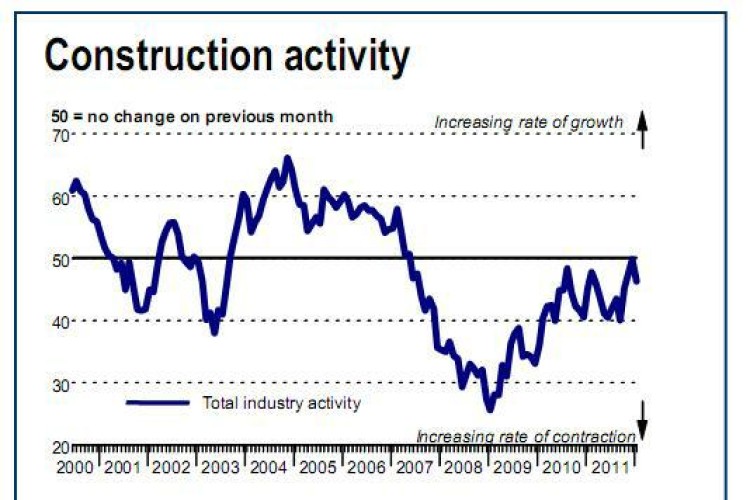Latest Ulster Bank figures for the Republic of Ireland show that, after stabilising at the end of 2011, Irish construction activity fell again at the start of 2012 as new business contracted. Meanwhile, jobs continued to be cut sharply in the sector.
The Ulster Bank Construction Purchasing Managers’ Index (PMI) is a seasonally adjusted index designed to track changes in total construction activity. It fell to 46.4 in January, from 49.9 in the previous month. The reading signalled the fastest reduction in activity in three months.
Commenting on the survey, John Fahey, economist Republic of Ireland at Ulster Bank, said: “The January reading of the Ulster Bank Construction PMI showed that the construction sector experienced contraction in activity last month. Having been very close to the expansion – contraction threshold of 50 last month, it fell to 46.4 in January, representing its fastest pace of contraction in three months. From a sectoral perspective, the latest results showed that housing activity fell back into contraction in January after its brief period above 50 in December. Instead in January it was the turn of commercial activity to record an increase in activity with a reading of 51.3 – the first time the survey has indicated a rise in commercial activity since October 2007. The civil engineering sector continues to underperform, once again being the weakest of the three sectors, with a reading of 37.7. Indeed this level represented an acceleration in the pace of decline, meaning civil engineering is likely to continue to lag the other two sectors over the coming months. The construction sector remains in a job shedding mode. The contraction in employment quickened over the month, with employment continuing to decline as it has done in each month since May 2007.”
He added that while the contraction in overall activity accelerated in January, some of the forward-looking elements of the January survey offered some slight encouragement. “Although the new orders index showed some renewed weakness in January, the decline took it to only slightly below the 50 mark, having been above 50 for two of the previous three months. This is consistent with the broad pattern of tentative signs of stabilisation in activity levels. In terms of industry expectations, overall, construction firms still expect activity to be higher in 12 months’ time, with the level of optimism on this scenario increasing to its highest level since last May.”

In contrast to the trend for overall construction activity, commercial activity increased in January. Although only slight, the expansion was the first since October 2007. Housing activity decreased in January, after rising in the previous month. Civil engineering remained the worst-performing sector, registering a further steep contraction in activity.
Panellists linked the overall drop in activity to falling new business. New orders decreased marginally at the start of 2012, following an increase in December. The seasonally adjusted new orders index has fluctuated around the 50.0 no-change mark in recent months. Where new business decreased, firms mentioned weak client confidence amid uncertain economic conditions.
Caution regarding economic conditions was also a factor behind falling employment, which decreased sharply in January. Staffing levels have declined on a monthly basis in each month since May 2007.
Input prices increased for the twenty-first successive month in January. Despite remaining marked, the rate of cost inflation was weaker than the long-run series average.
Got a story? Email news@theconstructionindex.co.uk



